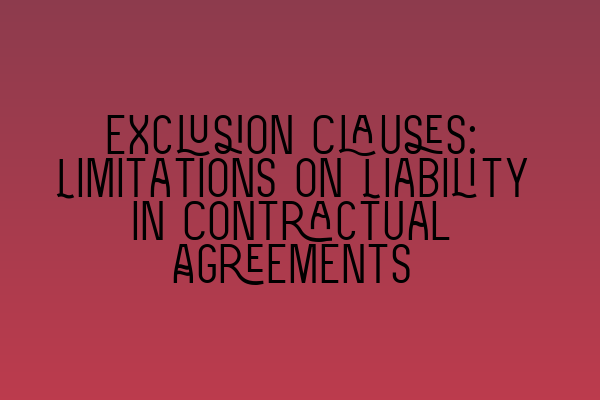Exclusion Clauses: Limitations on Liability in Contractual Agreements
Exclusion clauses play a crucial role in contract law by providing parties with the ability to limit their liability in the event of a breach or other contractual disputes. These clauses are essential in protecting parties from potential financial and legal consequences and can help maintain the balance of power between the parties involved. In this blog post, we will explore the concept of exclusion clauses, their types, enforceability, and their significance in contractual agreements.
What are exclusion clauses?
Exclusion clauses are contractual terms that seek to exclude or limit the liability of one party in the event of a breach of contract or other specified events. They are created by express agreement between the parties and are often included in written contracts. These clauses aim to define the scope of liability and restrict potential claims that may arise from a breach of contract.
Exclusion clauses can cover various scenarios, including the exclusion of liability for personal injury, property damage, delays, losses, or any other specific consequences resulting from a breach. While they are primarily used to protect the interests of the party seeking to limit liability, they can also be advantageous for both parties by providing certainty and reducing the risk of costly litigation.
Types of exclusion clauses
There are different types of exclusion clauses that can be used in contractual agreements:
- Exclusion of liability for negligence: These clauses aim to exclude liability for damages or losses caused by negligence. They provide protection to parties in situations where negligence may occur but are subject to specific legal requirements and restrictions.
- Exclusion of liability for consequential loss: Consequential loss refers to indirect or secondary damages that result from a breach of contract. Exclusion clauses may seek to exclude liability for such losses, but the courts tend to strictly interpret and scrutinize these clauses to ensure fairness and reasonableness.
- Limitation of liability: Limitation clauses aim to place a cap on the amount of liability a party can be exposed to in the event of a breach. These clauses can set a specific monetary limit or refer to a formula that calculates the maximum liability.
- Exclusion of liability for specific events: These clauses seek to exclude liability for specific events or circumstances, such as natural disasters, acts of God, or force majeure events. These clauses can provide protection when events beyond the control of the parties occur and prevent the fulfillment of contractual obligations.
Enforceability of exclusion clauses
While exclusion clauses are commonly used in contractual agreements, their enforceability is subject to certain legal requirements and tests. In order to be enforceable, exclusion clauses must satisfy the following conditions:
- Reasonableness: Exclusion clauses must be fair and reasonable. They should not be excessively one-sided or create an unfair advantage for one party over the other. The reasonableness of a clause is assessed based on the circumstances surrounding the contract, the bargaining power of the parties, and the nature and importance of the contract terms.
- Notice: Parties seeking to rely on an exclusion clause must ensure that the other party is aware of its existence and its implications. Providing clear and unambiguous notice of the clause before or at the time of the contract formation is essential for its enforceability. This can be done by including the clause in the written agreement, drawing attention to it, or ensuring that the other party has had a reasonable opportunity to read and understand the clause.
- Unfair Contract Terms Act 1977 (UCTA): UCTA provides additional protections for consumers and other parties against unfair contract terms, including exclusion clauses. UCTA renders certain exclusion clauses ineffective or subject to reasonableness tests, ensuring fairness and protecting parties from oppressive or unfair contractual terms.
The significance of exclusion clauses in contractual agreements
Exclusion clauses are a fundamental component of contractual agreements as they provide parties with a mechanism to allocate risk and limit potential liability. They allow parties to negotiate and agree on the extent of liability in advance, thereby reducing uncertainty and the potential for costly legal disputes.
By including exclusion clauses in contracts, parties can protect their businesses, assets, reputation, and financial stability. They provide a level of predictability and enable parties to manage their risks effectively. Moreover, exclusion clauses can also facilitate smoother negotiations, foster trust, and promote a fair balance of power between the parties.
It is imperative for parties to draft exclusion clauses with care and seek legal advice to ensure compliance with applicable laws and regulations. Furthermore, being aware of recent legal developments and court interpretations of exclusion clauses can help parties anticipate potential challenges and strengthen the enforceability of their contractual agreements.
Conclusion
Exclusion clauses serve as critical tools for parties to protect their interests and limit liability in contractual agreements. Understanding the different types of exclusion clauses, their enforceability requirements, and their significance is vital for both solicitors and parties to negotiate and structure contracts effectively. By utilizing exclusion clauses appropriately and in compliance with legal standards, parties can foster trust, mitigate risks, and maintain a fair and balanced contractual relationship.
Related Articles:
